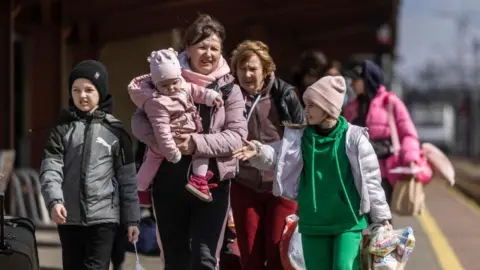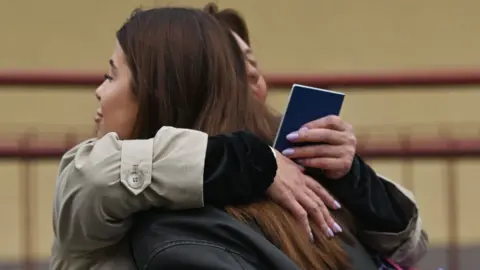Ukraine war: Welsh government scales back services for refugees
 Getty Images
Getty ImagesRefugees who fled war-torn Ukraine to live in Wales will have to start paying for laundry and some meals, under new Welsh government plans.
The changes will affect refugees who have been in temporary accommodation for five weeks.
They will also be charged a fee if they turn down two offers to rehouse them.
Rooms in hotels, holiday parks and other accommodation are being funded through Wales' super sponsor scheme.
A letter from First Minister Mark Drakeford explaining changes to the scheme was being sent to refugees on Thursday.
It said the changes were meant to help people into long-term accommodation as early as possible and "settle into life in our country".
From January, refugees who have been in Welsh government-funded accommodation for more than five weeks will have meals reduced from three a day to two.
They will also have to start paying for their own laundry; free toiletries, sanitary products and nappies will stop; and pet-owners will have to pay for their animals' food and vet bills.
Also after five weeks, refugees who turn down two offers to move on to permanent accommodation will also face a service charge of £25 a week - rising to £37 for a family of four or more.
The changes could affect as many as 1,500 people, once they have been in accommodation for five weeks.
'Help people integrate'
They will not be implemented in most places until 9 January, but four councils are piloting accommodation fees from 1 December.
Officials denied the move is intended to save money, but said it will help people integrate into the community.
The Welsh government funds the super sponsor scheme, which is distinct from the wider UK government Homes for Ukraine system, although no new visas are being provided because the scheme is paused.
 Getty Images
Getty ImagesAbout 1,600 people with Welsh super sponsor visas are yet to come to the UK, but it is not expected all will use them.
It was unable to move people on from initial accommodation - originally dubbed "welcome centres" - into other accommodation as fast as it wanted.
It was initially envisaged they would stay in welcome centres for weeks, but that turned into months, although officials claim the speed that people can move into a supported placement, such as a vetted host placement or the private rented sector, is increasing.
About 800 are said to have gone through that process of moving into different accommodation, with 500 in Wales and the rest elsewhere in the UK. Officials have not been able to provide a breakdown of how many have been given host accommodation, or have found another type of home.
Officials said they want to find ways of increasing people's independence and reduce "the financial disparity" that people experience when they move out of Welsh government-funded hotels.
The first five weeks of a stay will be like the scheme operates now, with the Welsh government not expecting refugees to pay for the services they receive.
After five weeks, in which time universal credit should be provided if they are eligible, they will be expected to arrange for their clothes to be cleaned themselves, and to pay for at least one meal a day.
'Costly hotels'
Social Justice Minister Jane Hutt told BBC Wales: "It's really just about making sure they (refugees) have got the essential services and then they can contribute - on universal credit, in jobs.
"Also making sure they can make choices about food and self-catering is really what people want.
"We've got many already in self-catering accommodation.
"It is a way of encouraging and ensuring that independence is gained."
In a third phase, the Welsh government will try to find the refugees places to live. If two "reasonable offers" are refused, a charge will be levied to help fund councils to source additional offers.
Some authorities - Wrexham, Monmouthshire, Conwy and Blaenau Gwent - are already piloting the scheme.
There are roughly 1,500 people in initial accommodation, and officials have been unable to provide a figure for how much the Welsh government has spent as a whole.
Ministers are also now looking at getting out of some of their "spare capacity", beginning with more "costly hotels", officials say.
Meanwhile officials said they would like more hosts to come forward, with currently about 700 waiting to be matched or are in the process of being matched.
